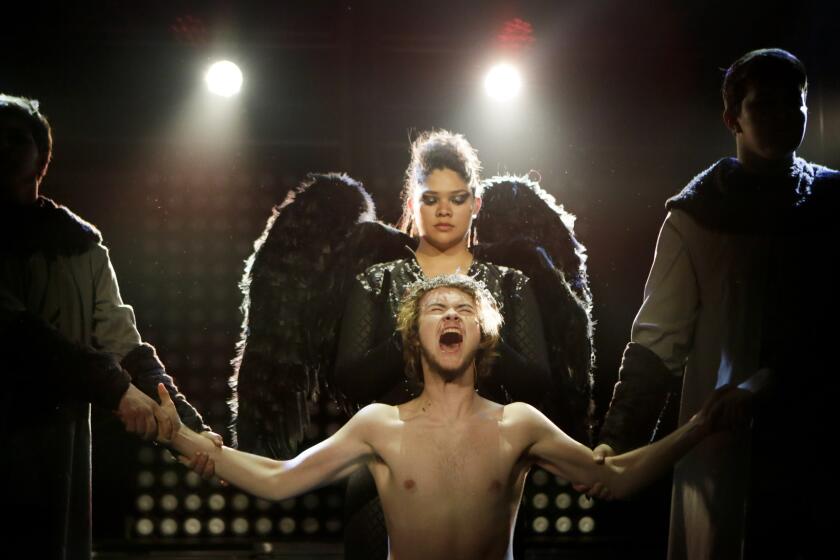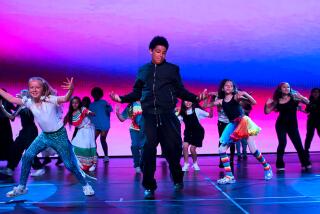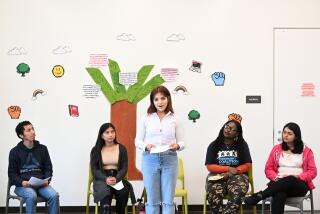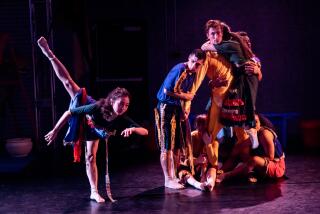Coronavirus threatened their spring musical. But theater students say the show must go on
- Share via
Adam Castrillon was sitting in an Orange County School of the Arts classroom in mid-March, listening to morning announcements, when he heard the news that upended the rest of his school year.
All spring performances were being canceled amid the coronavirus outbreak.
Castrillon’s heart sank. For months, the senior had been looking forward to the final performance of his high school career at the arts-focused charter school in Santa Ana.
Soon after, OCSA students would learn that all classes and other in-person gatherings would be nixed as well.
Theater productions, concerts, art exhibitions and dance recitals have been canceled across the country, leaving disappointed students and faculty alike. Yet at an arts school, performances aren’t an extracurricular activity — they are at the heart of these young artists’ specialized education. The prospect of canceling the spring musical, for Castrillon and others, stung more than missing out on prom or graduation.
“I walked around with a cloud over my head for pretty much the rest of the day,” the 18-year-old Mission Viejo resident said.
But OCSA musical theater instructor Scott Barnhardt wasn’t ready to give up. He envisioned a different kind of musical, one that wouldn’t need a stage and could allow performers to record their own vocals at home and film themselves with their own wardrobes and props.
Enter the new world of high school Zoomsicle and OCSA’s production of “Now. Here. This.”
The original off-Broadway musical that was recently re-imagined for high school and college performers was re-imagined again by Barnhardt and 20 OCSA students. The show — two months in the making and performed entirely online — debuts Thursday evening on YouTube. The production will be available through Sunday.

“This was about progress, not perfection,” Barnhardt said. “It was about finding a way through this difficult moment. We had to grieve that we couldn’t do this show the way we wanted. We had to grieve that we didn’t get this finish line for the 11 graduating seniors, but there was also an opportunity to take pause and find a way through.”
Based on a collaboration by Hunter Bell, Michael Berresse, Susan Blackwell, Heidi Blickenstaff, Jeff Bowen and Larry Pressgrove, “Now. Here. This.” originally debuted at the Vineyard Theatre in New York in 2012. Told over a series of short musical scenes and based on the experiences of the original creators, the show delves into questions and emotions that most teens grapple with.
In OCSA’s performance, the themes of longing for attention, wishing for something more out of life and struggling with self-acceptance play out in a series of vignettes performed by the cast members over roughly 90 minutes.
The students were weeks into rehearsals at school when the pandemic hit. Blackwell, one of the original writers, had arranged to fly from her home in upstate New York to Orange County to work with the group in adapting the musical, but stay-at-home orders thwarted that plan so they carried on with their lessons via Zoom.
A week later, the first virtual meeting included cast members’ reading of the script. It was glitchy and far from perfect, but the raw talent of the performers floored Blackwell, she said.
Still, the student’s disappointment was palpable on the video chat. Blackwell urged them to imagine what each scene would look like as a music video or film and to brainstorm some ideas. She encouraged them not to give up.
“I don’t care how they see you. I want people to see your work. I want people to see you. I believe in you so much,” she told them on the call.
After coronavirus crisis shuttered schools, high school shows were canceled. For many performing arts students, it feels like a blow to their future.
At first, they didn’t know where to start. It hadn’t been done before. After getting the green light from the show’s licensing house, Concord Theatricals, and school administrators, the group began working on one virtual number.
“One became two,” Blackwell said. “Two became three, then four and it grew from there. The students were into it. The students’ parents were into it. They were seeing their kids energized in a way that they hadn’t seen in any other context during the quarantine.”
Some scenes were recorded by parents or siblings on cellphones, others were captured on Zoom and some even incorporated effects from social media platforms like TikTok.
Junior Rebeka Hoblik ended up pulling her sister, brother and parents into her number, “Give Me Your Attention.” The catchy, comical song follows three girls in their quest to get attention from their parents. Hoblik plays a girl trying to get her family to notice her by singing a song in the living room after Christmas dinner.
“Her dad stops it because it’s a very annoying song and nobody really wants to hear it,” Hoblik said. “[The girl] talks about how she has this insatiable need for attention and doesn’t really understand even why she feels that way — which is very relatable, I think, to a lot of people.”
The 17-year-old from Anaheim spent three hours in her father’s small walk-in closet recording vocals for the piece, hoping that the clothes hanging inside would absorb some of the sound to improve the quality, a process she described as “painstaking” but fulfilling.
In another online scene, Hoblik got her mom to help transform her into an ‘80s teen with a Madonna-inspired hairstyle. The process, though starkly different from traditional stage prep, gave her a new appreciation for letting go of expectations.
“Most of the time performing, you can’t see yourself, but when you’re in front of a camera, it’s right there in your face. It’s so easy to be judgmental of yourself and feel inadequate,” she said. “It was difficult trying to get footage I could be proud of and be OK with watching. I had to learn to accept what I had done and accept the work I had done and just let go.”
Castrillon, who has performed in four main-stage productions over the past three years, was initially skeptical about how the group could pull off an online-only production. But he said he’s since realized it doesn’t take a live audience to make a performance.
“The show will go on,” he said. “It’s possible to still be creative and expressive and invite people to share your art even if it’s from your bedroom.”
Ultimately, Barnhardt said the video performance captures an essential lesson from the coronavirus quarantine: Sometimes life doesn’t go as planned — and sometimes what happens instead is even better.
“If we’re just looking at the creative project and process, there’s almost something cooler in what we’ve accomplished. They’ll have this video diary of quarantine that actually has a positive spin,” he said. “There are these little silver linings and really cool moments throughout this dark time that we can look back on and be grateful to have.”
More to Read
Sign up for Essential California
The most important California stories and recommendations in your inbox every morning.
You may occasionally receive promotional content from the Los Angeles Times.












